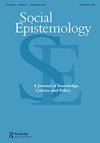通过社会神话对抗认识论压迫:欧洲最后的原住民
IF 2
2区 哲学
Q1 HISTORY & PHILOSOPHY OF SCIENCE
引用次数: 0
摘要
本文章由计算机程序翻译,如有差异,请以英文原文为准。
Counteracting Epistemic Oppression Through Social Myths: The Last Indigenous Peoples of Europe
ABSTRACT Epistemic social oppressions such as ‘epistemic partiality’, ‘epistemic injustice’, ‘epistemic harms and wrongs’, ‘epistemic oppression’, ‘epistemic exploitation’, ‘epistemic violence’, or ‘epistemicide’ are terms with increasing theoretical importance and empirical applications. However, less literature is devoted to social strategies to overcome such oppressions. Here the Sorelian and Gramscian concept of social myth is considered in that sense. The empirical case is the myth of ‘The last Indigenous peoples of Europe’ present in the Basque Country, divided between France and Spain and with a historical national culture under their statist powers. The myth has a renewal in a recent social movement, the Biltzarre platform and its Basque Cultural Instinct Team, currently followed through a Participatory Action Research. The results show how such social myth gives coherence and empowers the Basque identity against the loss of identity caused by the French and Spanish powers. Finally, progress is being made on how epistemic oppressons can end, ironically, because of the success of an epistemicide. Presumably, social myths counteract epistemic oppression, strengthening the social identity and self-esteem of the subject, as a form of empowerment in social and political issues.
求助全文
通过发布文献求助,成功后即可免费获取论文全文。
去求助
来源期刊

Social Epistemology
Multiple-
CiteScore
2.60
自引率
17.60%
发文量
60
期刊介绍:
Social Epistemology provides a forum for philosophical and social scientific enquiry that incorporates the work of scholars from a variety of disciplines who share a concern with the production, assessment and validation of knowledge. The journal covers both empirical research into the origination and transmission of knowledge and normative considerations which arise as such research is implemented, serving as a guide for directing contemporary knowledge enterprises. Social Epistemology publishes "exchanges" which are the collective product of several contributors and take the form of critical syntheses, open peer commentaries interviews, applications, provocations, reviews and responses
 求助内容:
求助内容: 应助结果提醒方式:
应助结果提醒方式:


